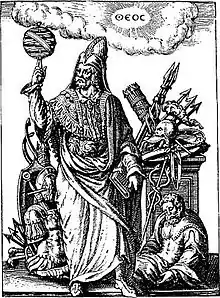Asclepius (treatise)
The Asclepius, also known as the Perfect Discourse (from the Greek Logos teleios),[lower-alpha 1] is a religio-philosophical Hermetic treatise. The original Greek text, which was likely written in Alexandria between 100 CE and 300 CE,[1] is largely lost and only a few fragments remain. However, the full text is extant in an early Latin translation, and fragments from a Coptic translation have also been found among the documents discovered in Nag Hammadi.[2]
| Part of a series on |
| Hermeticism |
|---|
 |
The text takes the form of a dialogue set in Egypt between Hermes Trismegistus and three of his students: Asclepius (a grandson of the Greek god and physician Asclepius), Tat, and Hammon. Hermes describes the physical makeup of the universe, the nature of the four elements, and the differences between individual souls. He professes the ultimate oneness of the world with God, despite the illusion of duplicity.
Medieval Latin readers had access to many Hermetic treatises of a 'technical' nature (astrological, alchemical, or magical, often translated from the Arabic).[3] However, the Asclepius was the only Hermetic treatise belonging to the 'religio-philosophical' category that was available in Latin before Marsilio Ficino's (1433–1499) and Lodovico Lazzarelli's (1447–1500) translation of the 17 Greek treatises that constitute the Corpus Hermeticum.[4] During the Middle Ages, the Asclepius was falsely attributed to the Middle Platonist philosopher Apuleius (c. 124–after 170).[5]
The text of the Asclepius was used by the philosopher Peter Abelard (1079–1142) and his student Robert of Melun (c. 1100–1167) as a means to prove that knowledge of the Trinity was naturally available to pagans.[6] Albertus Magnus (c. 1200–1280) praised the idea developed in the Asclepius that the human being forms a link between God and the world, uniting in themselves both the spiritual nature of divine beings and the corporeal nature of the material world.[7]
Notes
- Alternative translations of the Greek title include the Perfect Word and the Perfect Teaching, in Latin Sermo perfectus.
References
- Salaman 2007, p. 11.
- Robinson 1990, pp. 12–13; Copenhaver 1992, pp. xliii–xliv. Critical edition of the Latin text in Nock & Festugière 1945–1954; English translations of the Latin in Copenhaver 1992 and Salaman 2007; English translation of the Coptic fragments in Brashler, Dirkse & Parrott 1990.
- See, e.g., Burnett 2004; Matton 2004. On the Arabic Hermetica, see Van Bladel 2009.
- Copenhaver 1992, p. xlvii.
- Ebeling 2007, p. 54; Copenhaver 1992, p. 214.
- Ebeling 2007, p. 54.
- Ebeling 2007, p. 55.
Bibliography
Translations and editions
- Brashler, James; Dirkse, Peter A.; Parrott, Douglas M. (1990). "Asclepius 21–29 VI,8". In Robinson, James M. (ed.). The Nag Hammadi Library in English (3rd ed.). New York: HarperCollins. pp. 330–338. ISBN 978-0060669355. (English translation of the Coptic fragments)
- Copenhaver, Brian P. (1992). Hermetica: The Greek Corpus Hermeticum and the Latin Asclepius in a New English Translation, with Notes and Introduction. Cambridge: Cambridge University Press. ISBN 0-521-42543-3. (English translation of the Latin text)
- Nock, Arthur Darby; Festugière, André-Jean (1945–1954). Corpus Hermeticum. Vol. I–IV. Paris: Les Belles Lettres. ISBN 9782251001371. (critical edition of the Latin text)
- Salaman, Clement (2007). Asclepius: The Perfect Discourse of Hermes Trismegistus. London: Bloomsbury. ISBN 9780715635643. (English translation of the Latin text)
Secondary literature
- Burnett, Charles (2004). "The Arabic Hermes in the Works of Adelard of Bath". In Lucentini, P.; Parri, I.; Perrone Compagni, V. (eds.). La tradizione ermetica dal mondo tardo-antico all'umanesimo. Atti del Convegno internazionale di studi, Napoli, 20–24 novembre 2001 [Hermetism from Late Antiquity to Humanism]. Instrumenta Patristica et Mediaevalia. Vol. 40. Turnhout: Brepols. pp. 369–384. doi:10.1484/M.IPM-EB.4.00105. ISBN 978-2-503-51616-5.
- Ebeling, Florian (2007). The Secret History of Hermes Trismegistus: Hermeticism from Ancient to Modern Times. Translated by Lorton, David. Ithaca: Cornell University Press. ISBN 978-0-8014-4546-0. JSTOR 10.7591/j.ctt1ffjptt.
- Lucentini, Paolo (2004). "Il problema del male nell'Asclepius". In Lucentini, P.; Parri, I.; Perrone Compagni, V. (eds.). La tradizione ermetica dal mondo tardo-antico all'umanesimo. Atti del Convegno internazionale di studi, Napoli, 20–24 novembre 2001 [Hermetism from Late Antiquity to Humanism]. Instrumenta Patristica et Mediaevalia. Vol. 40. Turnhout: Brepols. pp. 25–44. doi:10.1484/M.IPM-EB.4.00087. ISBN 978-2-503-51616-5.
- Mahé, Jean-Pierre (2004). "Théorie et pratique dans l'Asclepius". In Lucentini, P.; Parri, I.; Perrone Compagni, V. (eds.). La tradizione ermetica dal mondo tardo-antico all'umanesimo. Atti del Convegno internazionale di studi, Napoli, 20–24 novembre 2001 [Hermetism from Late Antiquity to Humanism]. Instrumenta Patristica et Mediaevalia. Vol. 40. Turnhout: Brepols. pp. 5–23. doi:10.1484/M.IPM-EB.4.00086. ISBN 978-2-503-51616-5.
- Matton, Sylvain (2004). "Hermès Trismégiste dans la littérature alchimique médiévale". In Lucentini, P.; Parri, I.; Perrone Compagni, V. (eds.). La tradizione ermetica dal mondo tardo-antico all'umanesimo. Atti del Convegno internazionale di studi, Napoli, 20–24 novembre 2001 [Hermetism from Late Antiquity to Humanism]. Instrumenta Patristica et Mediaevalia. Vol. 40. Turnhout: Brepols. pp. 621–649. doi:10.1484/M.IPM-EB.4.00119. ISBN 978-2-503-51616-5.
- Parri, Ilaria (2004). "Tempo ed eternità nell'Asclepius". In Lucentini, P.; Parri, I.; Perrone Compagni, V. (eds.). La tradizione ermetica dal mondo tardo-antico all'umanesimo. Atti del Convegno internazionale di studi, Napoli, 20–24 novembre 2001 [Hermetism from Late Antiquity to Humanism]. Instrumenta Patristica et Mediaevalia. Vol. 40. Turnhout: Brepols. pp. 45–62. doi:10.1484/M.IPM-EB.4.00088. ISBN 978-2-503-51616-5.
- Parri, Ilaria (2011). "Tra ermetismo antico ed ermetismo medievale: l'Asclepius". In Arfé, Pasquale; Caiazzo, Irene; Sannino, Antonella (eds.). Adorare caelestia, gubernare terrena: Atti del Colloquio Internazionale in onore di Paolo Lucentini (Napoli, 6-7 Novembre 2007). Instrumenta Patristica et Mediaevalia. Vol. 58. Turnhout: Brepols. pp. 43–58. ISBN 978-2-503-53490-9.
- Robinson, James M. (1990). The Nag Hammadi Library in English. 3th, revised edition. New York: HarperCollins. ISBN 978-0060669355.
- Van Bladel, Kevin (2009). The Arabic Hermes: From Pagan Sage to Prophet of Science. Oxford: Oxford University Press. doi:10.1093/acprof:oso/9780195376135.001.0001. ISBN 978-0-19-537613-5.